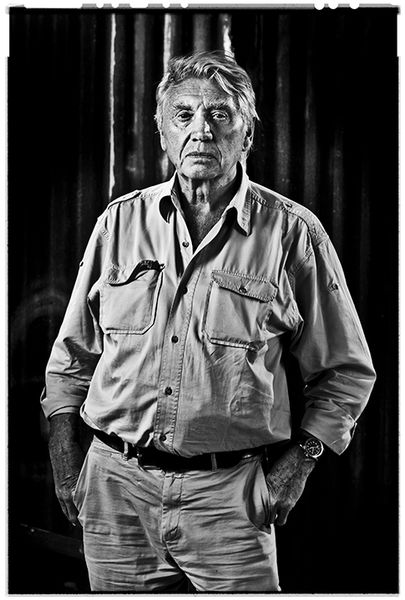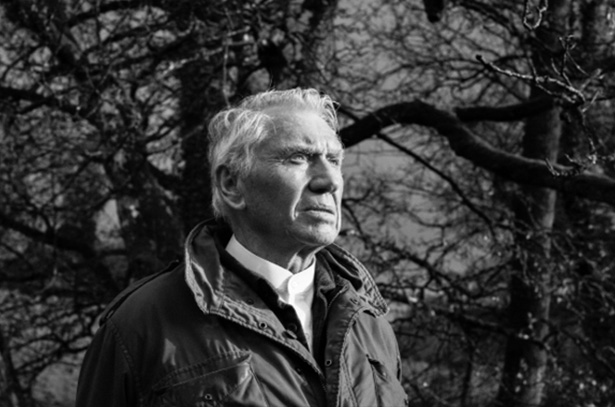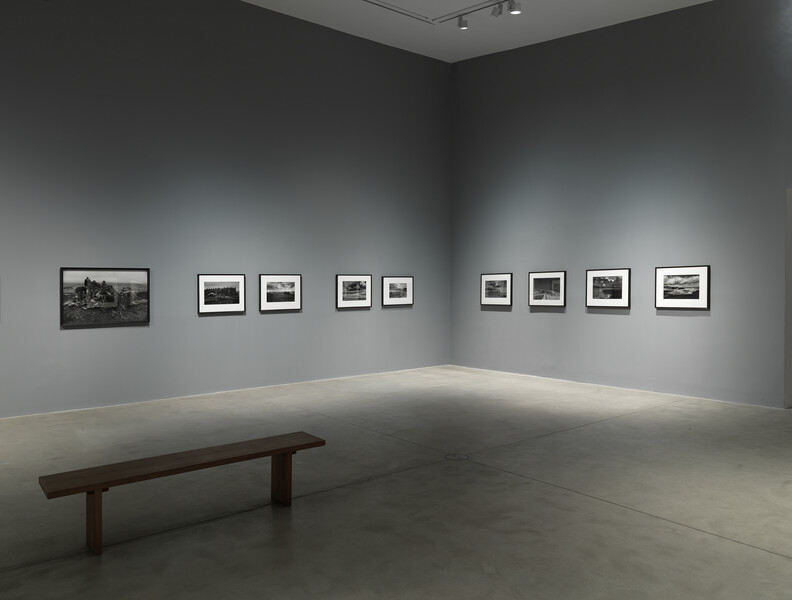
Don McCullin
23 June - 23 September 2018
Los Angeles
Selected images
Installation views
Related Content
About the Artist

Don McCullin
Renowned for an extensive oeuvre spanning a remarkable seven-decade career, Sir Don McCullin stands among the most celebrated and important photographers of the late 20th century. A combination of raw, emotional imagery and refined artistic sensibility underlines McCullin’s reputation as a master of his medium, capable of capturing both the harsh realities of the world and its profound beauty. Throughout, McCullin has provided an unflinching view of humanitarian crises and conflicts worldwide, while later endeavours simultaneously showcase his creative expertise through carefully composed still lifes, landscapes, and archaeological studies that carry with them the same honesty and grit of his earlier photographs. This year, McCullin celebrates his 90th birthday and becomes the recipient of the University of Oxford’s prestigious Bodley Medal: Life and Work award (2025), for his outstanding contribution to photography and journalism.
Don McCullin was born in 1935 in Finsbury Park, London. In 1959, following his return from National Service with the RAF, and postings in Egypt, Kenya, and Cyprus, he earned his first commission with The Observer, for his much-acclaimed photograph of a local gang named The Gov’ners. From this point began his early professional career, which shone a spotlight on the sobering reality of post-war life in Britain, including the stark landscapes of the industrial North, the increasing unemployment and homelessness levels in the capital, and growing unrest across the country.
In 1964, he returned to Cyprus, where he encountered his first taste of war, covering the violent intercommunal clashes of the Greek and Turkish Cypriots, for which he gained international recognition, receiving a World Press Award for his efforts. For two decades following, war would become the mainstay of his journalistic ventures, initially for The Observer, before taking post with The Sunday Times Magazine from 1966 to 1984, under Editor-in-Chief Harold Evans and Art Editor David King. His assignments included the Vietnam and Biafra Wars, ‘The Troubles’ of Northern Ireland, the Lebanese Civil War, the Belgian Congo, the Russian invasion of Afghanistan, and the fall of Phnom Penh. In pursuit of his work, he was wounded in Cambodia, fell from a roof in El Salvador, was imprisoned by the Idi Amin regime in Uganda, and contracted cerebral malaria in West Africa. It was during this time he released his most celebrated images, gaining recognition both as a master of black and white photography, and as history’s greatest war photographer.
For the last three decades, Don McCullin has sought to relinquish the burden of what he has witnessed throughout his career, turning to the land around him. In later years, he has returned to the Somerset area where he had been evacuated to as a child during the Blitz, and where he now resides. He often refers to the sweeping rural landscape as his greatest salvation, which he captures in dramatic, painterly representations. At home, McCullin has developed a series of meticulously constructed still lifes that provide a deeper form of escapism, drawing inspiration from the great Flemish and Dutch Renaissance masters.
Since the early 1980s, McCullin has focused his foreign endeavours on more peaceful matters, travelling extensively through Indonesia, India, and Africa, documenting his encounters with places and people lesser known to the Western world. Twenty-five years ago, he embarked on a journey to create a cultural and architectural survey of the remains of the Roman Empire, fascinated by expansive landscapes and ruined cities, to intimate close-ups of delicate stone sculptures. Through photography, McCullin pays tribute to the iconic beauty of their marble perfection, and the turbulence and turmoil they have encountered throughout their very existence.
Don McCullin is the recipient of the University of Oxford’s Bodley Medal: Life and Work award (2025), for his outstanding contribution to photography and journalism. He was awarded the Lifetime Achievement Medal at the London Design Festival (2022). In 2020, he received the Lifetime Achievement Award at the International Center of Photography in New York. He was knighted in the 2017 New Year Honours, for his lifetime services to photography. He was named Master of Photography at the 2016 Photo London Fair. In 2006, he received the Cornell Capa Award for Lifetime Achievement at the International Center of Photography in New York. In 2003, he received the Royal Photographic Society’s Special 150th Anniversary Medal and Honorary Fellowship (HonFRPS). In 1993, he was the first photojournalist to be honoured with a CBE, for his sustained and significant contribution to photojournalism.
McCullin has been the subject of a number of major retrospectives in institutions worldwide, including Tate Liverpool, UK (2021); Tate Britain, UK (2019); National Gallery, Canada (2013); C/O Berlin Museum, Germany (2009); Rome International Festival, Mercati di Traiano, Italy (2004); Foam, Amsterdam (2002); Maison Européenne de la Photographie, Paris, France (2001); Centre National de la Photographie, Palais de Tokyo, Paris, France (1993); Les Rencontres de la Photographie, Arles, France (1992); and the Victoria & Albert Museum, UK (1980). Other important solo presentations include ‘Don McCullin in Rome’, Palazzo delle Esposizioni, Rome, Italy (2023); ‘Don McCullin. Stillness of Life’, Hauser & Wirth Somerset, UK (2020); ‘Don McCullin: Southern Frontiers’, Château La Coste, France (2019); ‘Shaped by War’, Imperial War Museum, UK (2011); 'Cold Heaven. Don McCullin on AIDS in Africa', Whitechapel Gallery, UK (2001), United Nations Headquarters, New York, NY (2001); 'Don McCullin: Sleeping With Ghosts', Barbican, UK (1997); and ‘Hearts of Darkness: Photography by Don McCullin’, ICP International Centre of Photography, New York (1981).
Current Exhibitions
1 / 7















